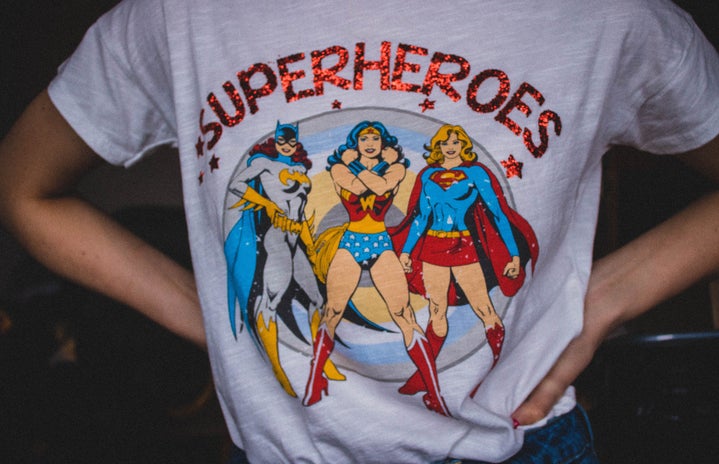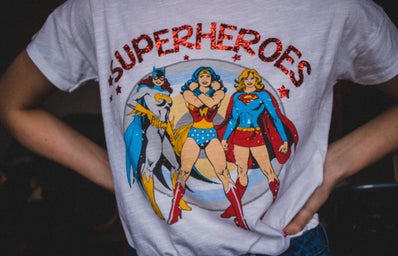Superman. Batman. Spiderman.
For most of us, it is easier to list off these names than it is to list off U.S. capitals. These fictional men are legendary and timeless images in our culture. They are defenders of justice—champions of good. For many people, these characters are the embodiments of the ideal role model. Want to guess what they have in common?
Bingo! They are all white and male.
Even in the vast and ever-expanding world of comics and movies, there continues to be a lack of quality representation of women and women-aligned characters. This becomes a huge lack when we think about the inclusion of women of color. As someone who dearly loves these fictional universes, it’s devastating to see such an ignorant blemish staining what could be very impactful media.
Let’s use the Marvel Cinematic Universe solo films as an example. Of the now 25 superhero movies in the franchise, seventeen are “solo films” that contain one superhero primarily front and center. Of these 17 films, two contain a white female lead: Captain Marvel (2019), and the very recent Black Widow (2021). One contains a white female lead who shares the title—secondarily, of course—with a man in Ant-Man and The Wasp (2018), and finally, a whopping zero of these seventeen films depicts a woman of color as the lead.
Not only does the superhero film world severely lack representation, it also lacks good representation. One of the strongest and most fearsome women in the MCU, Black Widow, has been done an incredible disservice by the male writers for Marvel. While her masculine counterparts are allowed to be strong, stoic, funny, or arrogant, she is almost exclusively allowed to be one of two things: sexy or motherly. This is especially prevalent in her earlier appearances in Iron Man 2 (2010) and The Avengers (2012).
This is not to say that Black Widow’s character should not be depicted as sexual or maternal. In fact, her ability to seduce men and kill them is crucial to her superhero identity. But to deny her a full range of emotions and development, to deny her character traits other than just the male sexual fantasies of harlot and matron, and to deny her a solo film for so long that she is dead before the audience even gets to see her work on her own—it’s all a huge injustice to her character.
There are, of course, a few good examples of female heroes in cinema, especially recently. One of my favorites is the film Birds of Prey (and the Fantabulous Emancipation of One Harley Quinn) (2020). The movie follows anti-hero Harley Quinn as she seeks to create a name for herself, a name separated from her recent ex’s—the Joker. It also features the coming together of the DC femme superhero group affectionately named the Birds of Prey. Harley is witty, violent, feminine and charming. Her penchant for glitter does not compromise her ability to kick ass, nor does it absolve her of her faults.
This is all great, but representation must also extend beyond the screen. It comes with little surprise that the director of Birds of Prey, Cathy Yan, is a Chinese-American woman. Having female and POC writers, directors, producers and editors is so important for creating stories that align with the accurate experiences of marginalized groups. After all, a story about a woman created by only men is usually disingenuous at best, and downright harmful at worst.
For those of you that may find yourself saying, “Why does this matter?” I understand where you’re coming from. In the grand scheme of things, there are certainly far more pressing issues than what kinds of people we see in movies. However, in a society consumed by media, it is important. Media such as entertainment shapes our views on the world, and in turn, our views on ourselves. It sends messages that we need to be mindful of. It gives young children ideas about where they fit in their community, and subsequently, where they don’t fit. Who we don’t see in movies affects who we don’t see in a lab coat, in a law firm, or in the White House.
I remember watching the first Marvel superhero movie with a female lead, Captain Marvel, two years ago in theaters. To watch Carol stand up to her oppressor was more moving than I expected it to be. This movie about finding identity and belonging hit home for me on so many levels, and the fact that it was carried by someone I could recognize myself in was fulfilling in a way I cannot express.
I could write about this topic for hours. I could write about how nearly all of the Marvel films fail the Bechdel Test, or I could mention how far too many female superheroes (Supergirl, Batwoman, She-Hulk) are simply feminized and sexualized versions of already established male superheroes. I could, and may still, write about the recent terrible excuses of LGBTQIA+ representation in the MCU and the empty promises made to fans strictly for publicity purposes.
For now, I will end with this: representation matters. It matters because every little girl deserves to feel that she can be brave and powerful, every young person of color deserves to feel capable and cherished, and queer youth everywhere deserve to feel a sense of belonging and connection. Being seen matters for so many people, in so many ways, and superhero films have the potential to be an incredible vehicle for this representation.


